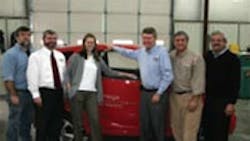Plugless plug-in hybrids,thanks to induction charging
To make it easier to recharge the battery packs in hybrid and all-electric cars, engineers at Evatran LLC, Wytheville, Va., have developed a wireless charger that fits in a typical consumer's garage. It relies on magnetic induction to create a current in a chassis-mounted adapter, which uses it to recharge the vehicle's battery pack. There is no need for any physical connection between car and charger. And the company claims it will work with any electric or hybrid vehicle equipped with a battery charger.
The entire system consists of three components: an onboard adapter, a 25 to 30-lb box affixed to the vehicle's chassis; the charging pad, a floor-mounted pad that magnetically induces a current in the vehicle's adapter; and a control tower, which holds the electronics and sends properly conditioned household current through the charging pad. The driver simply parks over the long, flat pad. The pad magnetically aligns its charging coils to similar coils in the adapter two to three inches away, and charging begins.
One downside to this process is that 20% of the electricity consumed by the tower gets wasted in the transfer. Evatran hopes to get that figure down to 10% before selling the device. (And losing this 10% only amounts to paying an additional $5 for every 1,000 miles, say Evatran engineers.)
The company plans to sell a version with a cord and a plug — it will not use magnetic induction — for about $3,350. It's is scheduled to go on sale this December, roughly the same time as the new hybrid Chevy Volt and the all-electric Nissan Leaf will hit the market. For an additional $800, customers can prepay for the plug-free charger (minus installation) that should be available next April. The charger is Level II 208/240 Vac, and the optional plug is SAE J1772 compliant.
Resources:
Evatran LLC, www.pluglesspower.com
